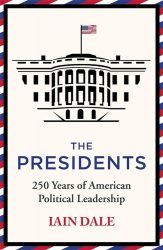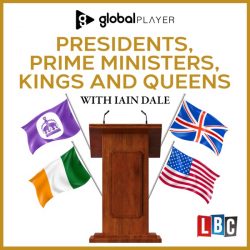 With our own general election out of the way, the next big political event will be the US presidential election. The next few months could well reshape America and influence the world’s political landscape for a generation or more. A question asked of our party leaders in one of the recent debates could equally well be applied to the US candidate: “Are you two really the best we have got for the job?” So, looking at a book which analyses all 46 US presidents in detail may answer that question, or at least tell us why we are where we are with the two candidates being offered to the American public. With the attempt on Trump’s life, and Biden stepping down as Democratic candidate this is looking like an election race like no other. But then you read back through some of the stories in this book and realise that Presidential elections have often had more than their share of drama.
With our own general election out of the way, the next big political event will be the US presidential election. The next few months could well reshape America and influence the world’s political landscape for a generation or more. A question asked of our party leaders in one of the recent debates could equally well be applied to the US candidate: “Are you two really the best we have got for the job?” So, looking at a book which analyses all 46 US presidents in detail may answer that question, or at least tell us why we are where we are with the two candidates being offered to the American public. With the attempt on Trump’s life, and Biden stepping down as Democratic candidate this is looking like an election race like no other. But then you read back through some of the stories in this book and realise that Presidential elections have often had more than their share of drama.
Iain Dale is a political commentator and broadcaster, and this is the second in a series of books, the first being on British Prime Ministers. The press release for the book explains it best. ‘The Presidents’ features essays, written by a range of academics, historians, political journalists and serving politicians, on all 46 American Presidents who have held the office over the last 230 years – from George Washington to Joe Biden. Each contributor has been carefully chosen based on expert knowledge of their subjects and personal connections, providing analysis of their subject’s successes, failures and influence.”
With 40-plus writers the book could easily have felt disjointed with varying writing styles, but Dale has managed to edit this into a consistent narrative. Keeping enough of the essay writer’s experience was important where they had personal experience of their subject. Davud Owen, who was Foreign Secretary at the time writing about Jimmy Carter for instance. If you do nothing else stand in a bookshop and read the introduction ‘The Office of the Presidency in History’, by Professor Scott Lucas. He sums up the last two and a half centuries wonderfully well and sets the stage for a detailed examination of the individuals.
 One of the most interesting aspects of this book is the accompanying podcast, in which Iain Dale interviews the authors and digs deeper into their conclusions. It certainly pays to listen to the podcast while reading the book as it does add a different dimension to the book experience.
One of the most interesting aspects of this book is the accompanying podcast, in which Iain Dale interviews the authors and digs deeper into their conclusions. It certainly pays to listen to the podcast while reading the book as it does add a different dimension to the book experience.
The book has to end somewhere, and in this case, it stops with Joe Biden only just elected. The podcast episode recorded 18 months later does partially fill in the blanks. The Prime Minister’s book ended similarly in 2019 so is now somewhat out of date, but scope for a second edition for both of them.
Dale freely admits that some of the 18th and 19th Century presidents were unknown to him, and it seems to most Americans. There are some surprising facts. The Democrat/Republican two-party system has been largely set in stone since about 1870, but one of the main takeaways from the book is how much mediocrity there is in the office of POTUS, Millard Fillmore anyone?
The chapter on Eisenhower by military historian Peter Caddick Adams is the most revealing. He clearly had no interest in being president up until the point that he was persuaded to run for office and seemed unconcerned about wielding power for its own sake. It feels like America needs an Eisenhower in 2024. Jimmy Carter and Harry S Truman both emerge as much bigger, better figures than you may have thought. The chapter on Nixon is another that suggests why the US is in its current state. Freddy Gray shows him as a political force of nature who set the tone for all the Republican presidents since, loathed and loved in about equal measure. Justin Webb manages to avoid being too personal about Donald Trump, but that chapter manages to make his potential reflection even more worrying simply because it is factual and analytical. Earlier presidents are mostly of historical interest of course, but even then themes run through the whole story. The main one as Dale points out in the podcast, is slavery. The degree to which the early US was oriented towards friendship with France makes you wonder if the “special relationship” exists only in the minds of UK prime ministers.
Who is president of the USA matters to the whole world, and this book gives us a fascinating set of views on those who have held that office and why. As a side note there are many speculative fiction books which look at what would happen if the USA turned into a 1 party totalitarian state, the best being Allen M Steele’s “Coyote.” It may be time to reread that…
‘Mr President (Have Pity on the Working Man)’ by Randy Newman could well be the theme tune for the current election campaign. Listen to the last verse and it could have been written last week not in 1974.


